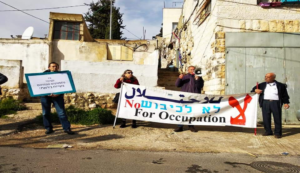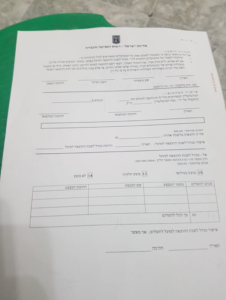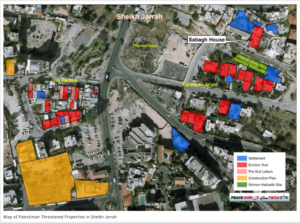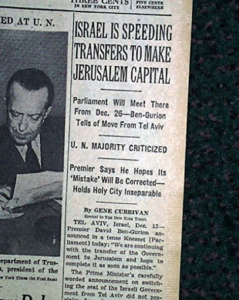
Friday Protests outside the Sabbagh Residence, January 2019
BY CATE BROWN
The traffic was bad. Saturday night and raining. Abed Sabbagh tapped his fingers on the dashboard of our taxi, gently strumming along to the oud streaming from Bethlehem’s 89.6FM. I watched as the procession of yellow license plates approached Mazmuriyeh checkpoint, some passing without inspection, others stalled by a throng of Israeli soldiers.
Abed is a Palestinian from the Sheikh Jarrah neighborhood of East Jerusalem. As a lifelong resident of Sheikh Jarrah, Abed has a blue Jerusalem ID card and drives a taxi with Israel’s authorized yellow plates. Both forms of documentation allow him to pass through the ‘Israeli-only checkpoints’ that separate Jerusalem from the Occupied West Bank.
Abed’s favorable documentation made him a welcome ally on my journey back to Ben Gurion International Airport. I had squandered my last few hours exploring Bethlehem’s Christmas markets, and the surcharge for Abed’s ‘Israeli-plates’ seemed like a small price to pay if I could avoid the crowds at Checkpoint 300, where 15,000 Palestinians cross each day.
I leaned forward to adjust the heat. “How long have you been driving a taxi?” I asked, shifting again to locate my passport.
“Since October,” said Abed, popping open the dashboard to grab his ID. “I used to work for USAID, but Trump cut our funding and everyone was laid off.” I glanced down at the passport in my hand and blushed. The past two years have seen a costly reorientation of American foreign policy towards Palestine. Where Secretary of State John Kerry tried to pursue a centrist agenda and revive Israeli-Palestinian peace talks, political appointee Jared Kushner and Secretary of State Michael Pompeo have placed American policy in lock-step with Netanyahu’s conservative Likud party. Specific policy decisions — like the suspension of all US contributions to UNRWA and the termination of USAID funding to Palestine— have reversed decades of American foreign policy decisions within the region and imperiled the lives of Palestinians on the ground.
“ID CARDS, PLEASE,” a curt voice interjected.
Abed passed our documentation to a somnolent soldier, and then turned back to me: “I’ll tell you something, society is moving more and more to the right. The media, the government: everything is going exactly where Israel wants.”
I lifted the corners of my smile as the soldier matched my passport to my face. As he glanced up and down with a bit more interest, everything inside me turned a sickly, saccharine sweet.
“The Israeli Authorities delivered my family a final eviction notice on January 3rd,” Abed said quietly, as we drove away. If evicted, Abed will join another 193 Palestinians who have been displaced from their homes in East Jerusalem since January— a rate of displacement that outpaces anything documented over the past thirty years. “My children ask why we are packing, and what I can tell them? Wednesday will come, and then where we will go…?”
* * *
Abed’s father Mohammad Sabbagh was born in 1948, just months after the United Nations adopted the Partition Plan for Palestine. His family is from Yibna, seven kilometers north of Palestine’s famed port city, Jaffa. His parents owned 60 acres of farmland and grew much of their own food. Citrus grows well along the Mediterranean Coast.
Mohammad and his family left the farm before he was old enough to walk. They were expelled by Israeli soldiers on June 4, 1948, just one month after David Ben-Gurion declared the founding of the modern Jewish state.
Like many, the Sabbaghs fled to Jerusalem, “And I remember every day and every second until now,” Mohammad insisted over the phone. He has lived in the same home in Sheikh Jarrah East Jerusalem since 1956 when the United Nations Relief and Works Agency (UNRWA) and the Jordanian government promised property deeds to his father as part of a joint humanitarian initiative targeting Palestinian refugees. The Sabbaghs were one of 28 select families who received housing under the program, and to this day, “we know all the families who live here,” said Mohammad.
Mohammad hopes that the documentation provided by UNRWA’s 1956 initiative will strengthen his family’s eviction defense: Where most Palestinian families lack titles for their homes, he can point to a legal document endorsed by the international community.
“I am not going to show myself as hopeless,” said Mohammad. “But everyone who comes to watch what is going on in the Israeli courts knows that [the proceedings] are a joke.”
* * *
Sami Ershaid is the family lawyer. He has worked with the Sabbagh’s since their first eviction notice on July 19, 2009. Sami is a native Jerusalemite and he represents ten of the families in the Kerem Al-jouni area of Sheikh Jarrah, where the majority of eviction notices have been disbursed.
In all cases, the families are in litigation against Nahalat Shimon International (NSI), a shadowy real estate company who “purchased” land in Sheikh Jarrah from the Jews who owned it prior to the 1948 war. Since 2003, Nahalat Shimon International has been taking legal action to evict Palestinian residents from their land. If successful, the firm will build a 200-unit settlement called Shimon HaTzadik in reference to the Second Temple high priest that they believe is buried there.

The Sabbaugh’s January 3, 2019 Eviction Orders
Evictions in East Jerusalem follow a predictable legal path. Most often, an Israeli citizen or development company files a complaint that property residents have violated the law, usually by expanding their home without an Israeli-issued building permit. The Jerusalem Municipality will then investigate the claim and if the allegations are confirmed, the municipality can evict the Palestinian residents or even demolish their home. On paper, the Jerusalem Municipality is simply enforcing zoning and building codes. But in practice, the penalties disproportionately affect Palestinian residents, who receive only 7% of the annual building permits issued in Jerusalem.
The Sabbaghs have been charged with both unpermitted construction and rent delinquency. In Sami’s opinion, the first charge is hard to avoid: In the five years prior to the Sabbagh’s initial eviction notice in 2009, only 130 Palestinian families in East Jerusalem received construction permits each year. This discriminatory policy has prevented Palestinian families like the Sabbaghs from accommodating generational growth, forcing families to make an impossible choice: they can separate their family and send some away, or expand and renovate in violation of Israeli law. Given this reality, many families elect to build additional housing units without permission.
The Sabbagh’s have an additional incentive to maintain their Sheikh Jarrah address: as residents of Jerusalem, their Jerusalem blue ID cards afford the entire family access to national healthcare and insurance benefits, as well as the right to move freely between Jerusalem and the West Bank. These marginal gains help both Abed and Mohammad overlook the discrepancies in public services offered in Jewish West Jerusalem and Arab East Jerusalem, where only 52% of the population has access to tap water and 76% of residents live below the poverty line. Under such conditions, families like the Sabbaghs work hard to protect the few privileges that their Jerusalem ID cards can afford.

A Map of the Palestinian Properties in Sheikh Jarrah, prepared by PeaceNow – 2019
The basis for Nahalat Shimon’s second legal claim of rent delinquency is more brittle. The company attorney cites the 1982 Toussia-Cohen Agreement, in which two settler groups filed a joint civil suit against 23 Palestinian families in Sheikh Jarrah. During the proceedings, Israeli attorney Yitzhak Toussia-Cohen did not challenge the validity of the settlers’ pre-1948 ownership claims and instead accepted the status of ‘protected tenants’ for all 17 of his Palestinian clients. This small clerical adjustment has allowed settler groups to claim ‘rent delinquency’ against their newly designated tenants. The Sabbagh’s friends, the Al-Kurd and Hanoun families, have already been evicted based on legal claims linked to their status as ‘protected tenants’.
Luckily for Abed and his family, the Sabbaghs were not one of Toussia-Cohen’s clients. Consequently, their legal status never changed from ‘lawful resident’ to ‘protected tenant’. This rare fact —coupled with their 1956 UNRWA documentation—should safeguard the Sabbaghs against legal claims linked to rent delinquency.
“Their next court date will come on September 5th, 2019,” Sami tells me. When the hearings resume, the Sabbaghs will be the first non-signatory family to have their ownership status challenged since an unsuccessful attempt to evict four non-signatory households in 1974. If evicted, the Sabbagh’s removal will signal a new chapter in Israel’s brazen disregard for United Nations’ documentation and international law. “The appeal process will be interesting,” said Sami. “But I have a couple of ideas about what we can do.”
* * *
The Sabbagh’s presence in East Jerusalem is cumbersome for the Israelis. Close to the Old City, Sheikh Jarrah is a long-time target of Israeli policymakers who seek to restore the 70:30 demographic ratio of Jews to Palestinians that existed within the Jerusalem metropolitan area in 1967. The Israeli Municipality’s “Jerusalem Outline Plan 2000” expressly states a goal of “maintaining a solid Jewish majority in Jerusalem”, in order to “to establish the status of Jerusalem as the capital of Israel and the center of the Jewish people.”
Policies guided by demographic manipulation and territorial expansion date back to Israel’s first political leaders. In 1948, Israeli President Chaim Weizmann cited, “the fact of [Jews] numerical preponderance among [Jerusalem’s] inhabitants as an indication that Jerusalem is and should remain ours,” a sentiment echoed by Prime Minister David Ben Gurion in his 1949 address to the UN General Assembly: “The peace, security and economic consolidation of Jerusalem [is Israel’s] principal care. For the State of Israel there is, has been and always will be one capital only. Jerusalem, the Eternal.”

Excerpted from the December 13, 1949 New York Times
Prime Minister Netanyahu intends to carry out the vision that his Zionist predecessors introduced. The campaign has been building momentum for years: residency revocations, home demolitions, and settlement expansions have long-driven Palestinians out of the city, displacing approximately 3,000 Palestinians from their East Jerusalem homes between 2004 and 2018. Impoverished public works programs have further incentivized Palestinians to relocate outside of Jerusalem, despite the benefits afforded by a Jerusalem ID.
But 2019 marks a new era. “After more than 20 years fighting Israel’s policy of demolishing Palestinian homes, I am witnessing one of the largest campaigns of demolitions since we started our work,” says Jeff Halper, Director of the Israeli Committee Against House Demolitions (ICAHD). Between the months of January and March 2019 alone, 193 Palestinians have lost their homes, often electing to ‘self-demolish’ their homes in order to avoid thousands of dollars in demolition fees charged by the Jerusalem Municipality. The Israeli rights group B’tselem estimates that another 330,000 Palestinians in East Jerusalem are at risk of losing their homes. “I don’t know how to react anymore,” says Jeff. “The scale of demolition makes protest and resistance impossible.”
* * *
Abed has decided to focus on the small wins: their delayed eviction, the Friday protests, the support of the international community. “I do not want to be a millionaire,” says Abed. “I just want a simple life, but I don’t want to leave it. I prefer a small apartment here in Sheikh Jarrah than a villa in another beautiful place.”
The Sabbagh family is just another victim of Israeli policies that have spanned seven decades. Some Israeli administrations have been more lenient than others, but the consequences of these policies have been consistent: expansion of Israeli control over Palestinian territory, and discriminatory restrictions on travel, jobs, housing, and services that make life difficult for Palestinians. With strongman President Trump and revanchist Ambassador David Friedman in office, Prime Minister Netanyahu has found welcome allies for his Zionist campaign. Over the past two years, the US administration has buoyed Netanyahu’s rapacious campaign to establish demographic and territorial control across Jerusalem and the West Bank, first, by announcing plans to relocate the US embassy to Jerusalem, and most recently, by recognizing Israeli sovereignty over the occupied Golan Heights. Both announcements came as the Trump administration shuttered the PLO mission in Washington, and closed the US consulate in Jerusalem–which has historically served East Jerusalem’s Palestinian residents– effectively ending all diplomatic ties with the Palestinian Authority.
Steady displays of international support have emboldened Israeli policymakers to further both their legalistic and territorial control: notably marked by the passage of the Nation State Law in July 2018, and a 20 percent increase in new settlement construction during the first nine months of 2018, as reported by anti-settlement monitoring group Peace Now.
As the 71st anniversary of the Nakba approaches on May 15th, marking the forced removal of over 700,000 Palestinians from their ancestral homes, ICAHD Director Jeff Halper fears that the Israelis are just mopping up. “They’ve displaced the indigenous population from 85% of the country,” he said. “And the rest are locked into Areas A and B in the West Bank, or effectively jailed in Gaza.”
For Israel’s remaining Palestinian residents, lawyer Sami Ershaid warns that their legal protections are all but gone. “Five years ago, I also spoke with American journalists and I used to tell them: If you really want to prevent a home demolition in East Jerusalem, call the American Ambassador: he was the only person who could stop a demolition. Now, I tell people to call the American Ambassador in order to speed up the demolition of Palestinian homes. Over the past two years, we have witnessed an 180-degree change.”